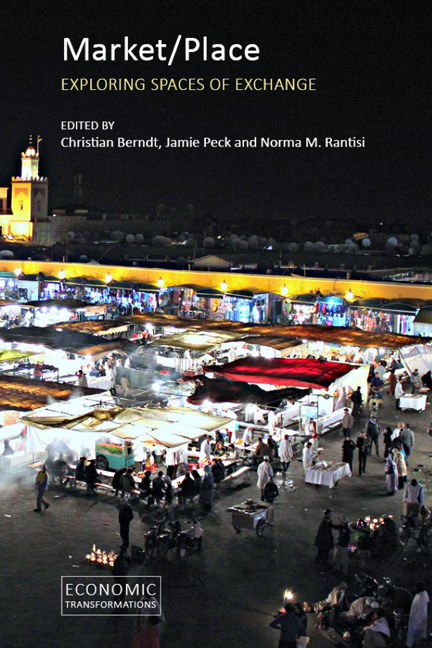1 - Introduction: exploring markets
Published online by Cambridge University Press: 23 December 2023
Summary
APLACE OF EXCHANGE
The origin of the present volume was an invitational workshop focused on questions of the spatiality and diversity of markets, held at the Karl Polanyi Institute of Political Economy in Montreal in the summer of 2017. This was an apt meeting place in a more than literal sense. Although many of those in attendance did not subscribe explicitly to a Polanyian worldview or mode of analysis, most had engaged with Polanyi's work in different ways. Some had made extensive contributions to neo-Polanyian scholarship, while others were more closely affiliated to radical political economy, performativity approaches or poststructuralism. In this context, more pertinent were a series of broadly aligned sympathies with what might be characterized as Polanyian dispositions, including: shared recognition of the importance of respectful, constructive and non-dogmatic exchange across an interdisciplinary range of heterodox and critical positions; overlapping concerns with the potential of empirically engaged and “substantivist” investigation (to borrow the Polanyian terminology), not just in testing and tweaking extant theories but in the construction of new insights, understandings and socio-political visions; and mutual commitments to humane, emancipatory and sustainable modes of socio-economic and ecological development. Polanyi himself never subscribed to a restrictive or singular mode of analysis. Best known for his searing indictments of market fundamentalism, which have acquired a new (if unwanted) relevance in this protracted era of neoliberalism, more programmatically, Polanyi was committed to the objective of continuously “widen[ing] the range of principles and policies at our disposal” (Polanyi 2014 [1950]: 137, emphasis added).
Something similar might be said about the field of economic geography, a second terrain on which the conversations behind this book were initially convened. Although economic geography may not be a discipline with all the answers, it can perhaps be credited as a source of some of the more demanding (and as yet still unanswered) questions, including those that animate the present volume. Is there a distinctive geography of markets, expressed territorially or in some other register? In what ways can the actually existing socio-spatial diversity of markets be approached, documented, categorized and theorized? How are we to deal with the abstract, ideal-type model of the market as it has been advanced by standard economic theory?
- Type
- Chapter
- Information
- Market/PlaceExploring Spaces of Exchange, pp. 1 - 26Publisher: Agenda PublishingPrint publication year: 2020
- 1
- Cited by

